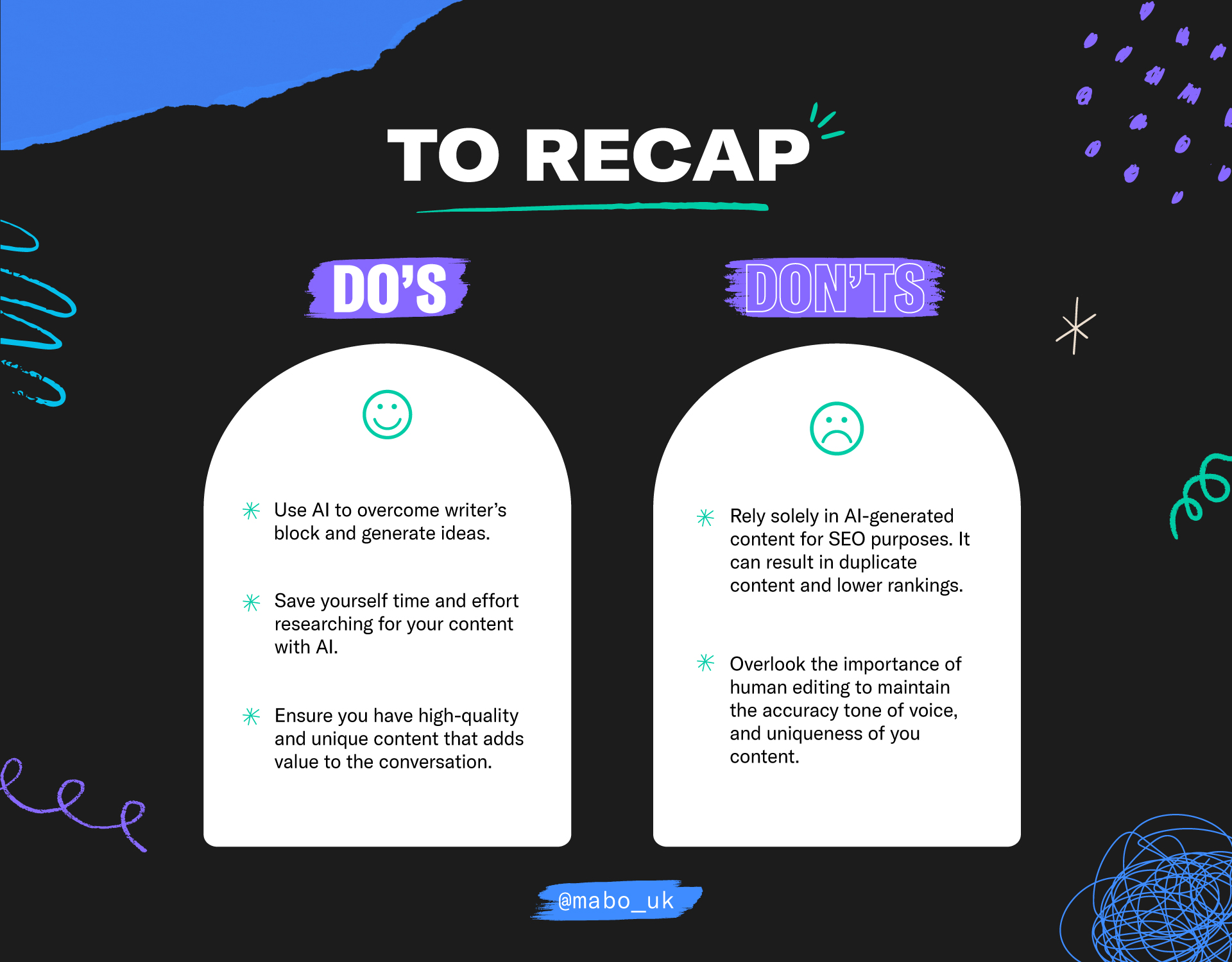In the ever-evolving world of digital marketing and content creation, the rise of AI has been nothing short of revolutionary. With the advancements released in the last year alone, like ChatGPT, Midjourney, and Google's Generative Search, it's clear that AI is massively transforming the landscape.
The internet is becoming increasingly saturated with AI-generated content, and opinions on its use vary widely. But in terms of SEO rankings, is publishing solely AI-generated content a help or a hindrance?
The important question is: What is Google looking for from content, and how can companies rank highly in this modern AI-driven digital marketing landscape? As we explore the potential of AI, it becomes crucial to understand its limitations and recognise why your content still needs that human touch.
The benefits of using AI.
Let’s face it; AI is a remarkable little helper that's available round the clock to anyone with an internet connection.
Its unparalleled convenience and support make it an invaluable tool, especially for content writers. With AI's ability to provide instantaneous results and unbiased assistance, it can truly lighten the workload and streamline various tasks.
However, while AI can be a valuable tool in the creative process, it should never replace human creativity and expertise. Instead, it should serve as a jumping-off point, providing inspiration and assistance to content creators.
If you want to dabble in using AI in your content creation, then here are a few recommendations:
Generating ideas.
AI is next-level at analysing large amounts of data and can instantaneously identify trends and patterns; it’s also a great jumping-off point for content creation when you’re struggling for inspiration.
Using AI to generate ideas and article frameworks can help beat ‘Writer’s block’ and save you time and a big headache. For instance, we asked ChatGPT the following question:
“Can you help me come up with some content ideas for my eco-conscious clothing company? I want it to be highly engaging and drive clicks and impressions.”
And it came back with this:
Sustainability Tips: Create informative and visually appealing infographics or short videos that provide tips on how to live a more sustainable lifestyle. Topics could include eco-friendly laundry practices, reducing clothing waste, or sustainable fashion trends.
Researching topics for content.
Gone are the days of asking a question to a search engine and sifting through numerous results, piecing together fragments of the desired answer. Instead, AI offers a remarkable capability to search and gather information and condense it into a single comprehensive answer saving you a mountain of time.
Editing content.
If you’ve written a sentence a few times and can’t seem to make it work, AI can give you a few examples of different ways to phrase the sentence and help you come unstuck.
The risks of relying solely on AI for content creation.
However handy AI can be in the process of content creation, relying solely on it can pose certain risks.
Risk of misinformation.
AI can be unpredictable, prone to errors and incredibly confident in doing so. The reason being is that it is a predicative generator; it doesn’t actually “know” what it’s talking about – it’s just a game of probability.
Duplicate content.
Search engine crawlers can identify duplicate content. If you use ChatGPT a few times, you may notice it has a particular way of speaking.
You may even begin to recognise it in content when you’re browsing online. If your competitors are using ChatGPT for content and you get duplicate content, it can seriously negatively impact your SEO rankings.
The importance of human editing in AI-generated content.
Human editing holds immense importance when it comes to AI-generated content. While AI has its strengths, it often falls short in capturing the subtle nuances of tone and voice unique to your brand.
Google acknowledges the significance of the human touch in its SEO ranking system, emphasising the qualities of Experience, Expertise, Authoritativeness, and Trustworthiness (EEAT) to reward high-quality content.
By adding a touch of personality, creativity, and authenticity, human input elevates AI-generated content to a whole new level while making it much more relevant to your target audience.
When we combine the capabilities of AI with human expertise, we can achieve a powerful synergy. While AI provides efficiency and speed, the human touch brings a deep understanding of language, cultural context, and the specific needs of a target audience.
Together, this partnership ensures that your content not only meets the highest grammatical standards but also resonates with your audience on a deeper level.
The Dos and Don'ts of Using AI in Content Creation.
To summarise everything we’ve just mentioned

- Do Use AI to overcome writer's block and generate ideas.
- Do Save yourself time and effort researching for your content with AI.
- Do Ensure you have high-quality and unique content that adds value to the conversation.
- Don't Rely solely on AI-generated content for SEO purposes. It can result in duplicate content and lower rankings.
- Don't Overlook the importance of human editing to maintain the accuracy, tone of voice, and uniqueness of your content.
To wrap it all up.
The most essential factors in creating content are ensuring that it’s compelling, reflects your brand's unique voice, engages your audience and surpasses the expectations of search engine algorithms. Embracing a collaborative approach to content creation, and combining AI and human expertise, can result in the best of both worlds.
Again, we thoroughly recommend you don’t rely solely on AI to generate content. AI should not be seen as a substitute for human creativity and discernment.
Instead, embrace AI as a complementary tool and leverage its capabilities to improve your work. Doing so can enhance your content creation process while maintaining the human touch that resonates with your audience.

May 30, 2023




